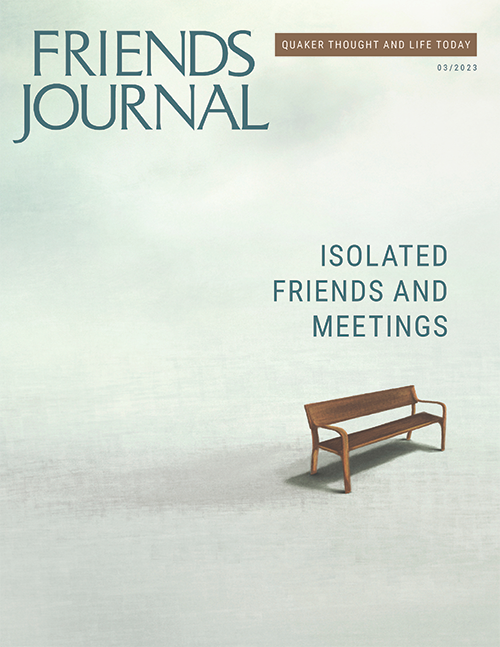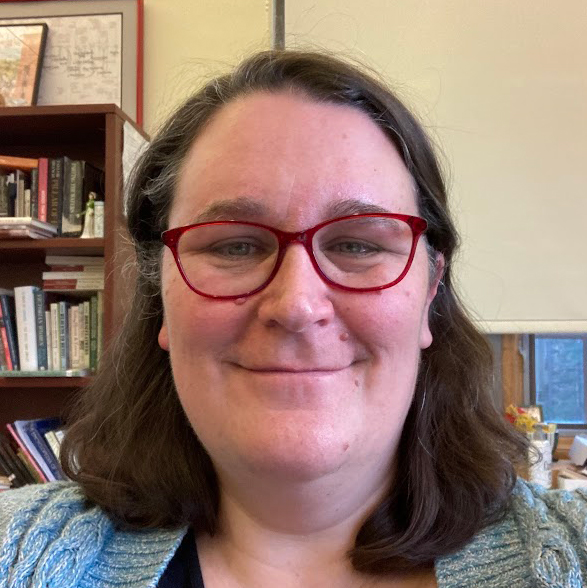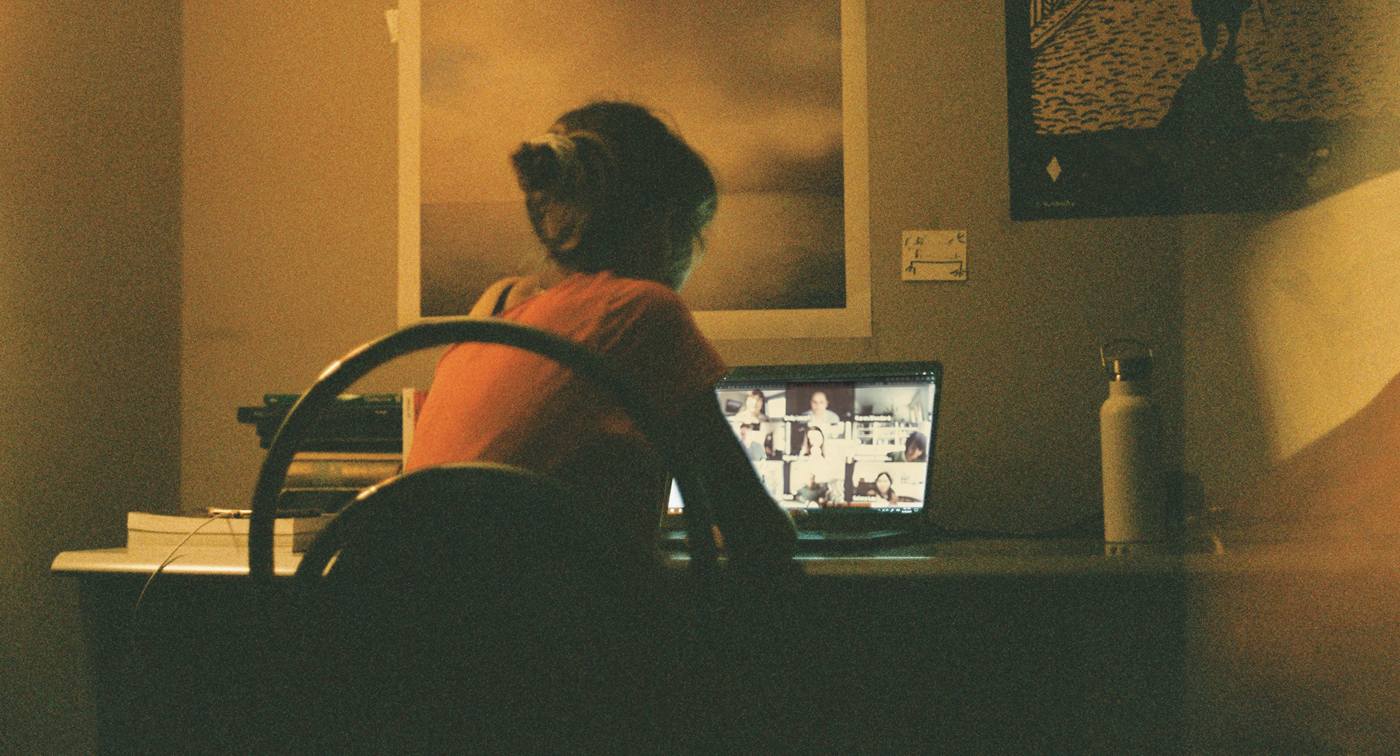A Case for Plain, Tech-Free Worship
In the spring of 2021, my husband and I began worshiping at our meetinghouse for outside worship on the porch with a small group who had begun to trickle back. For a year, we had been online worship stalwarts: teaching others how to use the technology and showing up multiple times a week for community and to support those who were quarantined at home, alone, for so much time. I wanted to keep my communities and institutions going during the pandemic as best I could, and showing up online seemed pretty central to those efforts. Since I didn’t have any other options, I spent vast swaths of the years of the pandemic on camera teaching high school English, gathering with family and friends, and worshiping. That it felt nothing like in-person worship seemed beside the point: online worship was the only option, and nothing in life was as it had been, anyway. It was a very stressful time for all of us.
So when we arrived at worship a bit late for our third First Day back on the porch, we were delighted, at first, to see so many loved ones joining us: there were lots of us there! Yay! Since my family had arrived uncharacteristically late, I kept my eyes lowered shyly, and we made our way to an open bench. I watched to make sure that my husband and his service dog were settled, and then I sat up and looked up. Right in front of me, blocking my view, was one of several electronic devices with cameras pointing at worshipers, set up to project our images to those at home who were joining remotely.
After a year of remote worship, and all of that horrible teaching and all of the online fatigue, I had a big, immediate, and unexpected reaction to the presence of those smartphones in meeting for worship. I left worship and fled to sob in the car. The in-person worship I had longed for, the experience I hoped would help us begin to heal from the pandemic disconnection, was being watched from afar by other people. To be sure, the Friends joining remotely had great reasons to do so, and they are people I love. But there are a lot of moments in my life—most in fact—when I wouldn’t want people I love watching from afar. I felt done with absent-but-present. We Friends were finally gathered again on the porch, after a year of isolation, and I was sitting in my car, crying and feeling alone.

Let me pause to say that I know very well that the technological bridges between our worship spaces and Friends far away are beautiful and crucial. I’ve worshiped with Friends in dire need who have joined from hospital beds hundreds of miles away. I know that Friends who simply could not make it out of the house are able to join in community nevertheless, and that their lives are better for it, and our worship communities are better because of them. The good that remote worship does is compelling, real, and important.
Given all of this, many Friends I care deeply about have struggled to understand why I keep speaking about the importance of preserving some in-person worship unmediated by technology. The inclusivity of the technological bridge speaks powerfully to Friends, so much so that sometimes I feel nothing else can be heard.
But there are trade-offs to remote worship, and it’s good for us to attend to those too. The trade-off that I know firsthand is that there are just so many of us who have learned well the incredible power of in-person worship, and who are weary of connecting remotely. We need a break. We also may be called to witness to the power of actually gathering together in body and spirit.
One visitor to our meeting told me that because of her work as a caregiver to an elderly person with disabilities and her life at home caring for a relative with disabilities, she had been effectively quarantined for two years. Her contact with others had been almost exclusively mediated by technology for almost all of that time. She said it felt odd and intense to be with other people again. At this point in our conversation, another beloved Friend joined us and invited our visitor to join our hybrid space where other Friends Zoom in to worship with us. The newcomer visibly shuddered and said no to the invitation. There was a small group of us gathered on the porch for an exclusively in-person worship, and she would stay there. I don’t know what the shudder was, but it did seem to me in the context and given our conversation that the invitation to videoconferencing was a reminder of profound and difficult isolation.
Another Friend who is a therapist has come to realize with dismay that her profession seems permanently changed. She trained and practiced for years to spend time with people all day—and now most clients prefer the convenience of staying home and clicking in for their therapy sessions. She sees kids who seem to already have been hunched over their video screens for hours, and whose parents expect them to stay right there at that same screen for a transformative therapy experience. She finds herself screen-weary, lonely, and in need of plain, technology-free worship.
I felt done with absent-but-present. We Friends were finally gathered again on the porch, after a year of isolation, and I was sitting in my car, crying and feeling alone.
In print and in person, I’ve heard some Friends refer to plain, in-person worship, unadorned by technology, as somehow stuck in the past or even stuck in the seventeenth century. The assumption seems to be that newer is better, and that worship with a technological bridge is the obvious wave of the future. Often, I read and hear that any consideration of plain, tech-free worship is by nature exclusionary and even ableist.
Of course it is an enormous blessing that we are able to welcome so many Friends from far away to our meetings. Of course it is. I honor this blessing and am grateful for it.
But we did not automatically eliminate the need for plain worship in the spring of 2020. The wave of the future may also be that some Friends can offer a space away from the online world to people who are weary of screens. Technology rarely replaces what came before it: it adds another choice. In my classroom, students sometimes use laptops to do their work online, but often paper and pencils or even chalk may be what’s best for the task at hand to meet the students’ needs. In today’s world, people walk and ride horses and bikes and drive cars. At work, I’ve learned that walking across campus to talk to someone in person, even for small mundane communications, is almost always powerfully better than emailing or even calling on the campus phone.

At some point, we will need to grapple with some of the trade-offs we have accepted by choosing to add a technological bridge to our worship. When will Friends who would have preferred a ride to meeting be less likely to ask for the ride, because they know they can join from their laptops? When might we inadvertently add to Friends’ isolation, rather than mitigating it, by making it so easy to join remotely? What is lost when we lose the casual interactions on the way into the meetinghouse, as we wait for the bathroom, and as we help jump a car with a dead battery? What might it mean over time for Friends meetings to have “competition” from so many other meetings around the world? What will it mean when Friends move around the world but choose to remain part of their Quaker communities from their former homes, rather than acclimating to new meetings in their new locations?
Taking time to consider these questions does not mean we stop valuing the presence of Friends who must join remotely. We can do both.
In a world where so much of our time is spent in front of screens, and so many of our relationships end up happening within the four walls of our Zoom squares, Friends may have a calling to continue to testify to the importance of simple, plain, in-person worship. Many people in our world are hungry for the chance to escape their online lives and just be together. Friends have had the honor of caring for this practice for hundreds of years, and it’s not time to fully lay it down, nor totally replace it, yet.








While I can relate to Zoom fatigue, this technology has enabled immunocompromised people to continue attending hybrid meetings during the COVID pandemic, which is not yet over. That applies to some of the remote attendees at San Francisco Meeting, who join over Zoom not because they live far away from the meeting house, but because they cannot risk sitting with groups in indoor spaces at this time. Our physical space is on a busy urban street, so meeting outside isn’t an option. I expect hybrid meetings will be with us for some time, and feel society is the better for technology that improves accessibility.
Yeah, the author seemed not to be in touch with any disabled people who still cannot be in person because the pandemic is still not over, especially for people who are the most at risk.
This article reeks of ableism and not understanding how Zoom has allowed disabled people to be involved in meetings in new ways.
This no doubt well intentioned article shines a light on a growing concern I have for our faith community: that Friends believe what is true for them is also true for others as well. The entire premise of this article is based on the idea that the author’s definition of what is simple and plain is universal for all Friends. I do not believe that this is the case.
Just as some Friends do not agree with me on which baseball team is better, Boston Red Sox or Philadelphia Phillies (please, the answer is obvious!) others do not agree with me on how I feel about using funds for the upkeep of historical Meetinghouses.
I believe disagreement between Friends is natural and healthy. I believe we should have rich and vibrant discussions with one another about the things we care about in our faith communities so we can go out into the world and be ready to handle conflict with love and compassion. Rather than assuming we all think and feel the same way about worship and other aspects of our faith, we should be brave enough to have courageous conversations and find out what one another really thinks.
It took time for me to “acclimatize” to the online platform for worship, learning and for staff meetings. Regarding the Friends online experience, I find the abrupt end to the meeting as I close the browser to be jarring. I am grateful for the tech making the meetings possible but miss the in-person fellowship after the meeting that eases me back into the day.
I wonder how I would feel were I a person who was able to attend meeting because of Zoom and I came across this article, finding that my presence in meeting has caused someone else to flee to their car and weep.
I have a completely different perspective from the author. I began attending a Quaker meeting for the first time during the pandemic. Although I attend in person, I feel that those who join via Zoom are valuable and treasured presences in our meetings, and I can’t imagine the meeting without them. Even if I have never met them in person, I look forward to seeing them each week and hearing their voices. I would be deeply saddened if any of them thought that providing them the opportunity to join us was somehow diminishing our personal or collective experience.
It is cliche to say that we live in a different world now, but we do. I believe that Zoom is here to stay, and instead of bemoaning the change from the old way, let’s embrace the new way and work to be as inclusive as possible.
Thank you for expressing what I’ve been feeling for a year now. It seems to me what was a welcomed and necessary tool during Covid has become, in some cases, an excuse to maintain distance from our fellow humans. With cameras everywhere we turn now, we’ve become subjects rather than participants. I understand why some people desire in-person worship without the intrusion of cameras. It’s not a rejection of the new. It’s not clinging to the old. We value the human contact. We value places we can sit in silence without smartphones and cameras intruding.